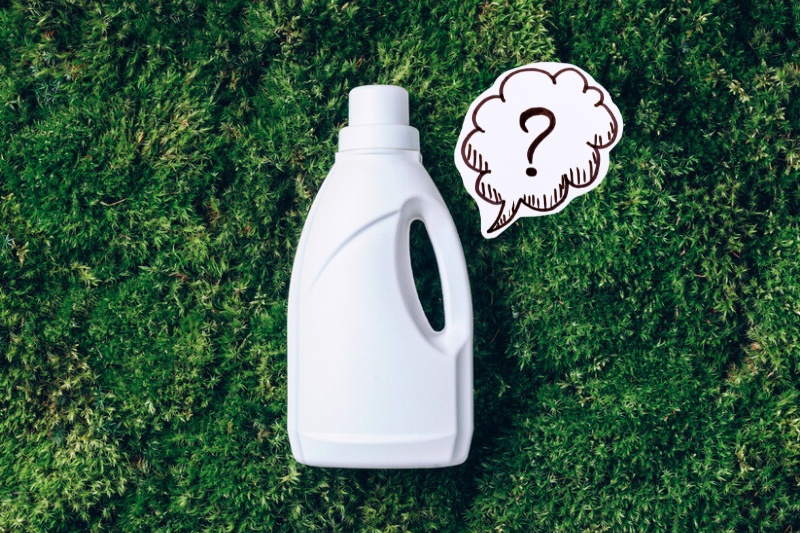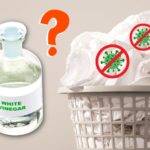Lawns feature in almost every UK garden. Many Brits take pride in keeping their lawns neatly mowed, fertilised, and weed-free.
But the quest for a spotless lawn often raises a critical question: Can household cleaning essentials, particularly laundry detergent, sabotage the appearance of our gardens? More specifically, will laundry detergent kill grass?
As we grapple with the balance between cleanliness and environmental responsibility, concerns about the potential harm laundry detergent might inflict on grass become more pronounced.
This article delves into this subject, exploring the effects of laundry detergent on grass and other plants.
Does Laundry Detergent Kill Grass?
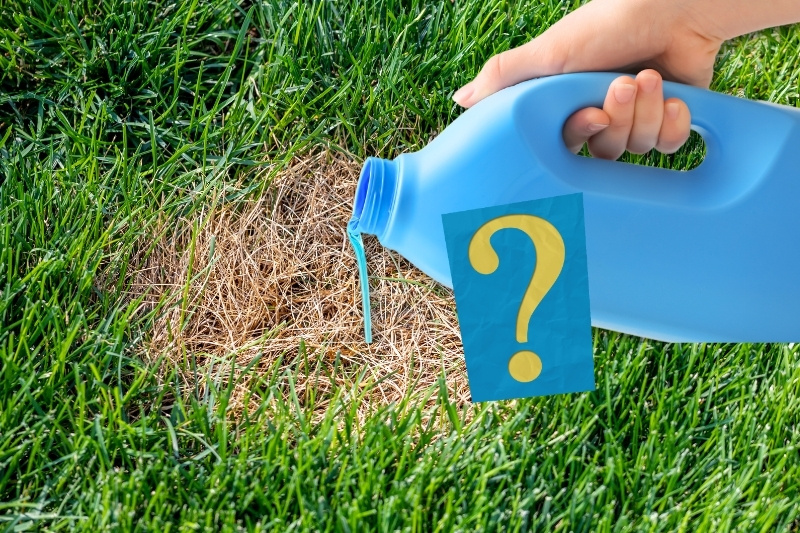
Laundry detergent can harm and potentially kill grass if it’s directly applied to the grass or if contaminated water containing detergent runoff reaches the grass.
Laundry detergents often contain chemicals, surfactants, and phosphates that can harm many plants—grass included!
If you accidentally spill or apply laundry detergent on your grass, it’s important to rinse the affected area with water thoroughly. This helps to dilute the detergent and minimise the damage to your lawn.
We also recommend that you avoid using concentrated or undiluted laundry detergent near grass or plants to lower the contamination risk.
If you’re worried about laundry products killing your lawn, switch from chemical to natural cleaning products and be cautious about runoff into grassy areas.
If you’re looking for a lawn-safe detergent, consider using environmentally friendly or plant-based detergents, such as Smol or Ecover.
What Is a Lawn-Safe Laundry Detergent?
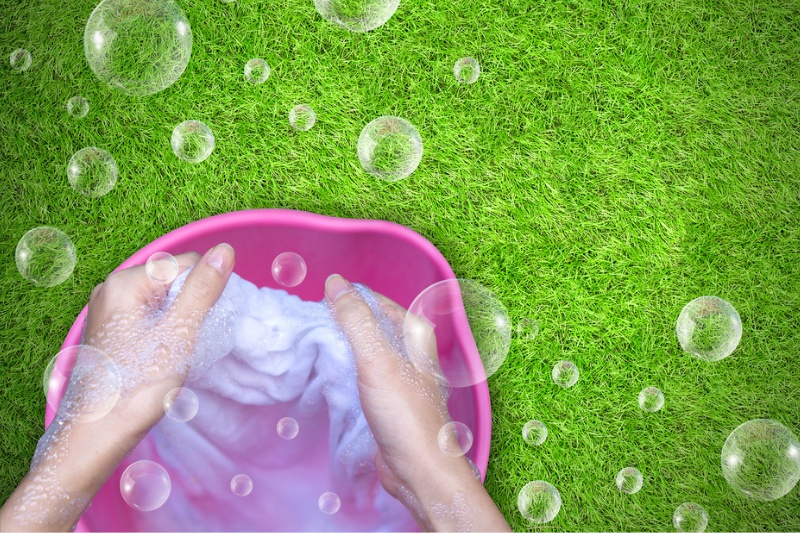
As the name suggests, a lawn-safe laundry detergent is one that has ingredients that are not harmful to plants, grass, or the overall ecosystem. Choosing these eco-friendly products is essential if you’re worried about laundry detergent killing the grass.
Popular lawn-safe detergent brands include Smol and Ecover, but other options exist. For help looking for a lawn-safe laundry detergent, consider the following features:
- Plant-based or biodegradable ingredients: Look for detergents made with plant-based or biodegradable ingredients. Ingredients that come from natural sources are less likely to harm plants and are more environmentally friendly.
- Phosphate-free: If looking for a laundry detergent that doesn’t kill grass or plants, choose one that is phosphate-free. Too many phosphates in the soil can damage plants, as well as harm waterways and aquatic life when they enter the wider ecosystem.
- Low chemical content: Opt for a detergent with fewer harsh chemicals, dyes, and fragrances, as these can be detrimental to plant life. You should also avoid detergents that contain chlorine bleach and optical brighteners.
- Neutral pH: Detergents with a neutral or slightly alkaline pH are better for grass, as highly acidic or alkaline detergents can damage plants and soil. Detergents with a neutral pH are also less likely to damage fabrics, making them the preferred detergents for delicates.
- Safe surfactants: Choose detergents with surfactants that are gentle and safe for the environment. Plant-based surfactants, such as those derived from coconut, palm, corn, and soybean oils, are a good choice.
Can You Use Laundry Detergent to Kill Weeds?
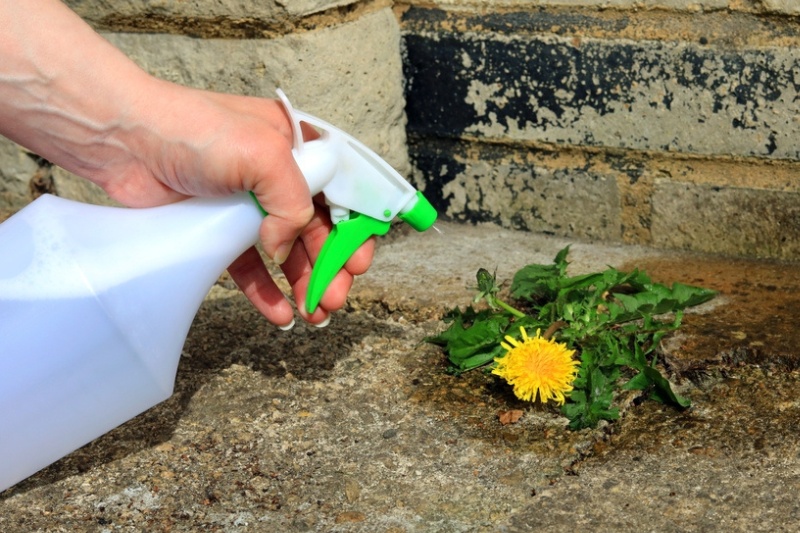
As mentioned, laundry detergents are bad for plants. But when talking about killing weeds, damaging plants is what you’re after.
The perfect lawn is entirely free from weeds like dandelions, daisies, and chickweed, and killing off these undesirable plants is a struggle for many gardeners.
Therefore, laundry detergent can act as a pesticide and be used to kill weeds. It is effective at killing the weeds in your garden for two main reasons:
- Boron content: Most laundry detergents contain a compound known as boron. Soil naturally contains a small amount of boron, which is vital for optimal growth. However, high levels accumulating in the soil are toxic to all plants.
- Surfactants: The surfactants in the detergents help remove oils. They can thus help break down the protective waxy coating on weed leaves, making it easier for natural pathogens to penetrate and effectively kill the weeds.
If using laundry detergents to kill weeds, it’s essential to use them carefully and in moderation, as they can also harm grass, other plants, and the soil if not used properly.
How Do You Put Laundry Detergent On Your Lawn?
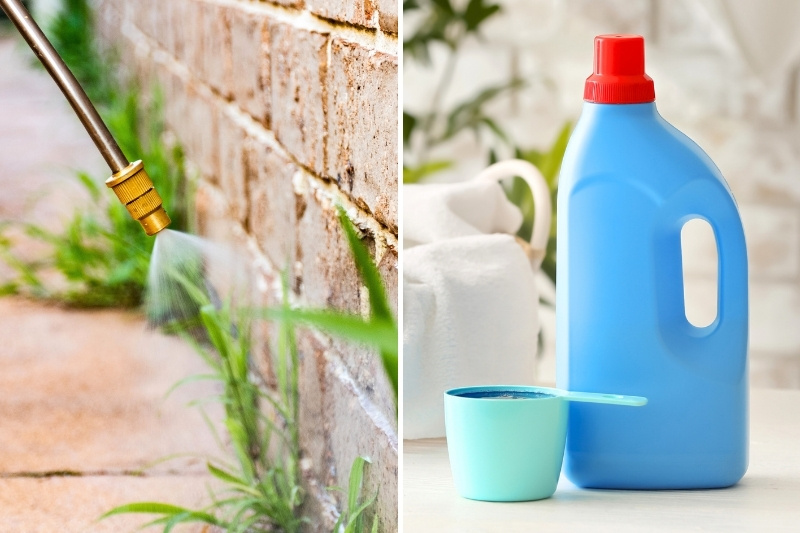
We only recommend using laundry detergent to kill weeds on your patio away from other plants.
However, here is a basic method for putting laundry detergent on your lawn to kill weeds if you’re willing to take the risk of a little damage to the surrounding grass:
- Mixing the solution: Mix a small amount of non-bio liquid laundry detergent (a few tablespoons) with water in a spray bottle or garden sprayer. Use a mild detergent and avoid ones with added bleach, harsh chemicals, or high boron concentrations.
- Spraying the weeds: Spray the solution directly onto the leaves and stems of the weeds, ensuring thorough coverage. It’s best to do this on a sunny day when the weeds are actively growing and turning their heads and leaves towards the light.
- Observing results: Monitor the weeds over the next few days to a week to see if they begin to wilt and die. If needed, repeat the application. You should also keep an eye on the surrounding grass and stop using the spray if damage occurs.
Keep in mind that laundry detergent is not a selective herbicide, meaning it can harm or kill any plant it comes into contact with, not just the weeds. Exercise caution when using this method to avoid damage to desirable plants nearby.
Also, consider using environmentally friendly and less harmful alternatives for weed control to reduce the impact you have on the environment.

Hannah has a passion for cleaning. She worked her way around Australia by cleaning hostels in exchange for free accommodation and used her cleaning skills to bag a job as a chalet host for a luxury ski company in France.
